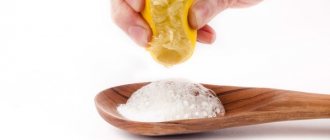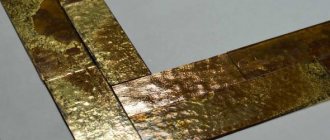When we hear the phrase “citric acid,” the first thing we think of is that it is some kind of food additive used in cooking for baking buns or buns. But in practice, the range of applications of this product is much wider. A solution from this organic product fights scale, cleans plaque on toilets and sinks, and refreshes silverware. In addition, if you add it to water and place flowers in this solution, they will retain their decorative properties for a long time. We will talk about how to use citric acid in everyday life in this article.
What is citric acid
Based on the name, we can assume that the substance is made from lemon. However, in reality this is not the case. In modern conditions, the substance is obtained through the biological synthesis of sugary substances and strains of special mold fungi. In other words, the acid is produced artificially - it is much simpler and more profitable than extracting it directly from citrus.
The useful substance belongs to the category of food additives and is known under the code E-330. It is used as a preservative, flavoring and antioxidant in the food industry. Acid is also actively used in other areas. Externally, it looks like a white fine-crystalline powder with a sour taste.
Where is citric acid found naturally?
Many fruits and berries contain this substance. It is also found naturally in pine needles and tobacco stems. Most of it is found in lemongrass and in crops that belong to the citrus group.
This is interesting! There is more of this acid in green fruits and berries than in ripe ones. As it ripens, its concentration decreases due to an increase in the content of natural sugars.
Composition and chemical properties of citric acid
From a chemical point of view, the E-330 additive is a tribasic hydroxycarboxylic acid. It contains citrates - salts and esters, vitamins C, E and A, sulfur, chlorine and phosphorus. Despite the fact that the composition of the substance may seem rather meager, the acid is valued for its high concentration of useful substances.
The chemical properties of citric acid are also of interest. The substance easily dissolves in ethyl alcohol and water, and when heated to temperatures above 175 ° C, it decomposes into carbon dioxide and water. The substance is easily mixed with other components and is not toxic to the environment.
Benefits of citric acid for the body
Despite the fact that the health benefits and harms of citric acid complement each other, when used wisely, it is very valuable. Small doses of the dietary supplement have a positive effect on the main systems of the body.
For men and women
The benefits and harms of citric acid for the human body are expressed in many ways. This substance:
- restores healthy metabolism and helps improve digestion processes;
- helps with liver function, as it accelerates the production of bile and helps cleanse the body;
- removes toxic compounds, toxins and even poisons from the body - there are special detox diets based on citric acid;
- acts as a mild natural laxative, has a diuretic effect;
- cleanses the blood and improves its composition, reduces blood pressure and strengthens the walls of blood vessels;
- reduces glucose levels, therefore it is an extremely valuable supplement for diabetics;
- has an anti-inflammatory and bactericidal effect both internally and externally;
- helps enhance the effectiveness of a diet aimed at losing weight;
- strengthens joints, tendons and connective tissue, protects against the development of joint ailments;
- strengthens the body's resistance to viruses and bacteria;
- maintains healthy and youthful skin.
The substance is known as one of the best hangover remedies - it helps to quickly cope with the consequences of intoxication.
For the elderly
It is especially useful to consume drinks and foods with additives in old age. The substance protects older people from joint diseases, prevents the formation of blood clots, and serves as a preventive measure for varicose veins. In addition, acid strengthens vision, which often decreases over the years, and increases the overall tone of the body.
For pregnant and nursing mothers
When used carefully in minimal dosages, the dietary supplement will be of great benefit to pregnant women. The substance will help expectant mothers protect themselves from colds, help relieve swelling and reduce the manifestations of toxicosis.
During lactation, the substance will enhance the production of breast milk. The valuable components in the substance will be useful for both mother and baby, as they will help support digestive processes and prevent constipation.
For children
Citric acid in minimal dosages is quite safe for children. Even on packages of baby food you can often find the E-330 marking - this means that the substance is already included in the mixture.
However, when used in children, it is necessary to carefully monitor the amount of the substance entering the child’s body. The permissible daily dose is only 60 mg per 1 kg of weight; if the dosage is exceeded, poisoning may occur. In this case, the harm to health will be serious, and you will need to urgently call a doctor.
Thus, children are allowed to consume the substance as part of feeding mixtures. But drinks with citric acid can be offered to a child only after reaching 3 years old and in small quantities. At the same time, you need to ensure that the baby does not develop allergies.
Attention! Since in some cases the substance is completely contraindicated for use, you should consult your pediatrician before offering the product to your child.
Citric acid for weight loss
Since the substance significantly speeds up metabolism, the beneficial properties of citric acid are used to quickly say goodbye to extra pounds. The way to use citric acid is to stir no more than 5 g of the substance in a liter of water, and then drink the home remedy before each meal. The substance will not only start the process of removing toxins from the body, but will also reduce appetite - this will help you not quit your diet halfway through.
Important! The benefits and harms of water with citric acid directly depend on the volume.
To ensure that the properties of the substance do not cause harm during weight loss, you can consume no more than 5 g per day. In this case, the acid must be thoroughly diluted in water and the daily dose must be divided into several parts.
How to drink water with citric acid for medicinal purposes
The substance can be consumed in its pure form only in very small quantities. However, even under this condition, it is successfully used in folk medicine.
- The benefit of citric acid for gout is that when this substance enters the body, it prevents the deposition of salts in the joints and normalizes purine metabolism. To treat and prevent gout, it is recommended to regularly take citric acid diluted with water before eating.
- The benefit of citric acid as an acidity regulator is that the substance relieves heartburn. To eliminate the unpleasant sensation in the stomach and esophagus, you need to dilute the acid with an equal amount of soda, add a glass of water and drink in small sips. However, for chronic heartburn and gastritis with high acidity, it is better not to use the product - its properties can aggravate the condition if taken regularly.
- The substance effectively helps with sore throat; it needs to be diluted in water and rinsed every hour.
We recommend reading: Baking soda: beneficial properties, uses, how to take
If you have a hangover, a healthy drink based on soda and citric acid will quickly relieve nausea and tachycardia. You can add a little sugar to it, you need to drink the medicine slowly and in small sips.
The use of citric acid in home cosmetology
Lemon powder is most often used in folk cosmetology - the substance E-330 has a very beneficial effect on the condition of the skin and hair. Of course, the health benefits and harms of citric acid need to be regulated here too and only proven recipes should be used.
Facial peeling
Gentle peeling is one of the most effective procedures for facial rejuvenation. Using citric acid, you can perform this procedure at home. It's done like this:
- remove all makeup from the face and wipe the skin with acidified lemon water to remove all impurities;
- then the skin is treated with a small amount of cosmetic oil to moisturize - for a quarter of an hour;
- then remove excess oil with a dry cloth and distribute pure lemon juice or a solution of the E-330 additive over the skin with a special brush.
After applying the liquid, the skin will immediately begin to tingle. This is completely normal, but you don’t need to endure the unpleasant sensation for long - during the first procedure, the peeling is washed off after just 2 minutes. Apply a nourishing mask to the reddened skin, and then treat the face with a good moisturizer.
If the procedure is carried out correctly, the face will become brighter after it, enlarged pores will narrow, and sebaceous plugs will disappear. The beneficial properties of peeling will have a noticeable tightening and rejuvenating effect.
Important! If you leave lemon peeling on your face for a long time, the procedure will result in a burn and cause harm.
Therefore, the solution should not be kept on the face for longer than 5-7 minutes, even with regular peeling use.
Whitening freckles and age spots
Citric acid is a good remedy for getting rid of freckles and brown spots on the skin. The face and body are treated several times a week with a 2% or 3% solution of citric acid in plain water. At the same time, the home remedy not only makes the skin lighter and removes freckles, but also mattifies the face.
Rinsing hair with citric acid
Substance E-330 strengthens hair well and regulates oiliness at the roots. It is recommended to rinse your hair with the following solution every time after washing your hair - dilute half a teaspoon of citric acid in 1 liter of warm water. Under the influence of the product, the hair will become silkier, stop falling out and acquire a beautiful shine.
Example of problem solution
What is the normality of a citric acid solution with pH = 1.8?
Solution
For solutions of weak acids the formula is valid: pH = 1/2 pKa -1/2 lg Cm
Since the dissociation constant of citric acid in the 2nd step is 40 times less than in the 1st step, we will limit ourselves to the first step.
K1 =7.45·10−4.
pKa = -log K1 = -log (7.45·10−4) = 3.128.
log Cm = pKa -2·pH = 3.128 - 2·1.8 = -0.472.
Cm = 10-0.472 = 0.337 mol/l.
Since citric acid is tribasic, the normality of the solution is
0.337/3= 0.112 n.
Answer: 0.112 n
Use of citric acid in the household
Along with cosmetology, the substance is actively used for household purposes, mainly as a budget cleaning product. The effect it gives is very good. But since a strong concentrate of the additive is used for cleansing procedures, you must remember to be careful and not allow the acid to get into your mouth or eyes.
Cleaning the washing machine
The properties of citric acid powder help remove scale from the internal elements of the washing machine. Cleaning is carried out as follows:
- 3 large spoons of powdered acid are poured into the powder compartment;
- set the longest washing mode at 60 degrees.
Of course, the washing machine must be empty. Sometimes there are recommendations to clean at a temperature of 90 °C. However, you should follow such advice only if the layer of scale on the internal elements of the device is very thick, otherwise citric acid and hot water will damage the rubber and plastic parts.
Cleaning the kettle from scale
The substance effectively removes scale from the inner walls of electric and regular kettles. Its properties are used as follows: the kettle is filled to the top with water, 30 g of powder is poured into it and boiled. Then the water is drained.
Advice! After cleaning the kettle, it is necessary to remove any caustic residue from its walls. To do this, you need to rinse it thoroughly and boil it a couple more times and drain the regular water.
Iron cleaning solution
Citric acid will help remove lime deposits and rust from the internal parts and external surfaces of the iron.
- You need to dilute 2 large spoons of lemon powder in a glass of water, then pour the liquid into the steam tank and heat the iron to maximum temperature.
- After this, the device is unplugged from the outlet, shaken thoroughly, and the steam release button is pressed a couple of times.
- When the iron has completely cooled down, you will need to drain the remaining solution from it and repeat the entire procedure two or three more times.
After cleaning with citric acid, the iron will need to be washed by heating ordinary clean water in it. If limescale or rust appears on the base of the device, they can be thoroughly wiped with a damp cloth soaked in acid, and then wipe the base again with clean water.
Removing plaque from silver items
The properties of lemon powder restore shine and beauty to silver cutlery and jewelry. It is enough to dilute 2 large spoons of the substance in 1 liter of water, spray them over the surface of the silver using a spray bottle, wait a little, and then rinse with water and wipe dry.
Disinfection of kitchen surfaces
Citric acid not only removes deposits, but also effectively disinfects. To remove greasy deposits and bacteria from the kitchen apron, countertops and stoves, just dilute the beneficial acid in water in a ratio of 1:9 and wipe all necessary surfaces with the solution. After this, they should be rinsed again with plain water and wiped dry with a cloth.
Rust removal
Citric acid deals with rust as effectively as with limescale. About 25 g of powder should be diluted in a liter of hot water, and then thoroughly treat rusted objects and surfaces with the solution, wait, rinse them with clean water and wipe dry.
Solution for cut roses
Another useful property of lemon powder is its ability to prolong the life of cut plants. You need to pour a liter of water into the vase, add only 0.2 g of citric acid and 40 g of sugar, mix the liquid properly and place live roses in it. The nutrient solution can maintain the freshness and beauty of flowers for several days.
Interesting facts about citric acid
- Today, the world consumes approximately 1,600,000 tons of citric acid, half of which, as I noted above, is produced in China.
- Do you know why people started making this product from mold? That's right, all because of the same commercial benefit! Aspergillus niger strains produce up to 99% citric acid. To obtain a volume of acid equal to 300 cubic meters, you will need 15 tons of these same fungi.
Agree, today I told you about a very controversial product. It is so alien to me that I use it exclusively for household needs for general cleaning of household and cutlery.
And at the same time, I don’t allow powdered citric acid into my food - I just don’t see any particular need, and I don’t like chemistry. What is your relationship with her? Please share your experience using this crystal powder in the comments.
Citric acid in cooking and canning
Additive E-330 is often used in the food industry - it adds an unusual flavor to fruit jams and jellies, sauces and mayonnaise, and marinades. Citric acid is also a good flavoring agent, so it can be found in teas, fruit juices and carbonated drinks; the E-330 additive is used in wine production.
The benefit of citric acid in preservation is that this natural remedy does not allow food to spoil over a long period of time. The substance is added to canned food and semi-finished products to extend their shelf life, and this does not affect the beneficial properties of the products.
Receipt
Natural ways to obtain
This acid was named citric acid by the Swedish chemist Carl Scheele, who obtained it in 1784 from unripe lemons. It is found in citrus fruits (6-8%), in shag leaves (8-14%) and many other fruits and berries. Citric acid plays an important role in metabolism in living organisms, including the human body, as it participates in the Krebs cycle.
Receipt in industry
Citric acid is obtained mainly by biochemical method. Its essence lies in the fermentation of sugar or molasses by strains of the fungus Aspergillus niger.
The traditional method of extracting shag leaves or citrus fruits has also retained its significance. A very small role in the production of citric acid is played by the chemical method of producing ketene by reacting oxaloacetic acid anhydride. World production of citric acid is about 2 million tons.
Making citric acid at home
It is possible to make concentrated citric acid in your own kitchen, but it will take a lot of time. The following method is usually used:
- Squeeze the juice from several lemons into a large saucepan;
- after this, a small saucepan with water is placed on the fire, and a large one with lemon juice is placed on top of it;
- The lemon juice is evaporated in a water bath until it has completely evaporated from the top pan.
At the bottom of the container, only a white crystalline coating will remain - this will be homemade citric acid. In practice, the method is rarely used, since the powder obtained is too little, and a lot of lemons need to be used to make it.
How to choose the right citric acid?
Keep a separate jar for citric acid.
Everything here is extremely simple - make sure that the bag in which this white crystalline powder is sold is dry. Carefully feel its contents, determine whether it is loose or collected in one large lump.
In addition, it is important to pay attention to the expiration date indicated by the manufacturer on the packaging and focus on it when selecting and storing the product.
How to properly store citric acid?
There are different opinions about how long citric acid should be stored. Some people think that nothing will happen to her even in 20 years. If you follow the rules for storing the product, then indeed, there is simply nothing there to spoil.
But it’s not for nothing that the manufacturer indicates the end date for using their product. On average, this is a period of one to two years. So focus on him! And don’t forget that any bulk products are better stored in glass or ceramics than in plastic, and, moreover, require cool and dry conditions.
Back to contents
Harm of citric acid and contraindications for use
The benefits and harms of citric acid for the human body depend not only on the dosage, but also on the state of health. It is prohibited to use the substance:
- for stomach ulcers and open ulcers of the esophagus and oral cavity;
- if you are allergic to citric acid;
- with increased stomach acidity;
- for sensitive tooth enamel.
When using the substance, you must always observe the minimum dosage - no more than 5 g of the supplement per day. When cleaning surfaces, you can handle acid only with rubber gloves, avoiding contact with mucous membranes and eyes.
Operating principle
Citric acid has a diuretic effect. The principle of its action is based on the removal of excess fluid from the body, due to which saliva becomes viscous, a person’s taste perception changes, the desire to snack is suppressed, which leads to a decrease in body volume.
According to the conclusion of the health organization committee, the daily intake of citric acid should not exceed 120 milligrams per kilogram of body weight. It is optimal for this indicator to be in the range from 66 to 80 milligrams per kilogram of weight.
In what cases does the body's need for citric acid increase?
With increased physical activity, manifestations of the effects of stress, under the influence of extreme external factors.
When should you limit your intake of citric acid?
For erosion of tooth enamel, hypersecretion of gastric juice, gastritis, stomach ulcer.
A possible sign of a lack of the compound in the body is the desire to eat something sour. A deficiency of organic acids causes alkalization of the internal environment, which is an extremely rare phenomenon. Considering the fact that the food additive E330 is used in cooking for the production of fizzy drinks, jelly, candy, sauce, preserves, mayonnaise, ketchup, jam, tonic drinks and iced teas, people more often develop an excess of the compound in the body than a deficiency.
Symptoms of overdose: inflammation and exacerbation of diseases of the digestive tract, sour taste in the mouth, caries, abdominal pain, cough, vomiting. Excess citric acid increases the content of calcium ions in the body, causing a burn of the mucous membrane of the gastrointestinal tract and oral cavity.
Is it possible to get poisoned by citric acid?
An overdose of the substance threatens severe harm from food poisoning. Symptoms include abdominal and stomach cramps, nausea and vomiting, diarrhea and signs of internal bleeding. Poisoning with the E-330 additive leads to a surge in blood pressure, headache and fever.
If signs of poisoning are observed, you should immediately consult a doctor. Large doses of citric acid can be deadly - 20 g of the substance can cause death.
Which is healthier: lemon or citric acid?
The acid concentration in the lemon itself is relatively low. However, it is still healthier. It contains a lot of additional components that are not found in food supplements, so citrus has a comprehensive effect on health. In addition, its accidental overdose causes less harm.
Important! At the same time, it is necessary to remember that in cosmetology and in everyday life the additive E-330 will be of great benefit. For all its beneficial properties, lemon is not so good for peeling the face or cleaning household appliances.











